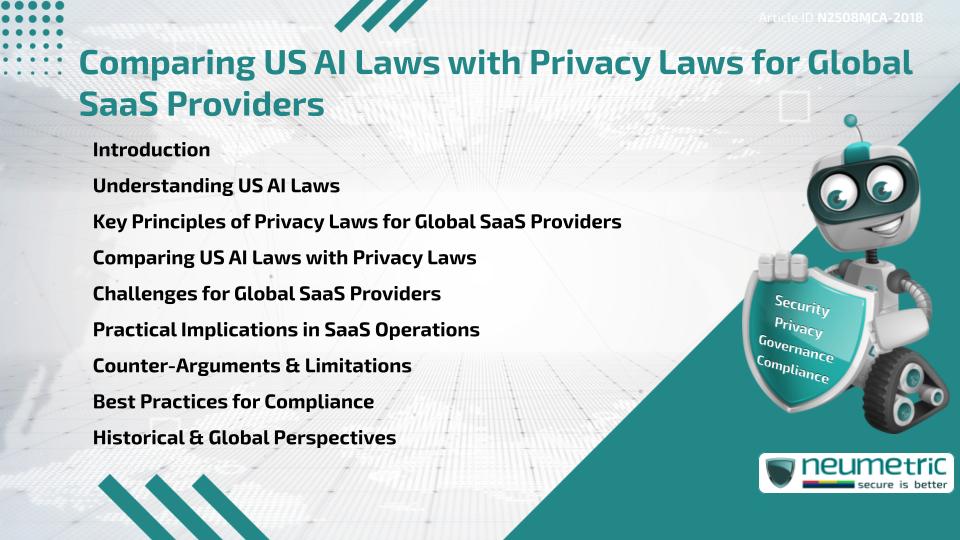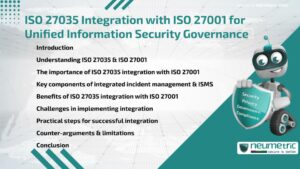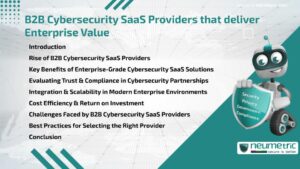Table of Contents
ToggleIntroduction
The rapid rise of Artificial Intelligence [AI] has forced governments to introduce new frameworks to regulate its use, particularly in the United States. At the same time, global Software-as-a-Service [SaaS] providers continue to face stringent Privacy requirements from international Data Protection laws. Comparing US AI laws with Privacy laws helps highlight where these two domains align, diverge & create challenges for businesses that operate globally. While AI laws in the US focus heavily on accountability, fairness & transparency in automated decision-making, Privacy laws such as the European Union’s General Data Protection Regulation [GDPR] prioritise the rights of individuals over their Personal Data. This article explores both legal frameworks, their impact on global SaaS operations & how businesses can balance compliance across multiple jurisdictions.
Understanding US AI Laws
US AI laws are still developing, but they are increasingly shaped by sector-specific & state-level regulations. For example, the Algorithmic Accountability Act seeks to ensure that automated systems do not perpetuate bias, while state laws such as the Illinois Biometric Information Privacy Act [BIPA] regulate biometric data used in AI Systems. The White House Blueprint for an AI Bill of Rights also sets ethical guidelines focusing on transparency, explainability & human oversight.
Unlike Privacy laws, US AI laws are not yet comprehensive at the federal level. Instead, they are fragmented across industries such as Healthcare, Finance & Employment. This creates both flexibility & uncertainty for SaaS Providers that integrate AI into their services.
Key Principles of Privacy Laws for Global SaaS Providers
Global Privacy laws aim to protect Personal Data across borders. The GDPR in Europe sets the gold Standard by requiring explicit consent, data minimisation & strict cross-border data transfer rules. Similar frameworks include Brazil’s LGPD & Canada’s PIPEDA.
For SaaS Providers, Privacy laws require robust data Governance, Encryption & Accountability measures. Non-compliance often leads to significant fines & reputational damage. Unlike AI laws, Privacy laws are well-established & harmonised in many regions, offering a clearer set of expectations.
Comparing US AI Laws with Privacy Laws
When comparing US AI laws with Privacy laws, several contrasts emerge. Privacy laws prioritise the protection of Personal Information, focusing on consent & individual rights. AI laws, however, are more concerned with how systems make decisions & whether those decisions are ethical, transparent & free of bias.
At times, the two frameworks overlap. For instance, AI Models trained on Personal Data must also comply with Privacy laws governing consent & usage. A SaaS provider building AI-powered recommendation engines must therefore balance Privacy safeguards with AI accountability measures.
The main divergence lies in scope. Privacy laws govern all types of Personal Data handling, while AI laws address the ethical operation of algorithms regardless of whether Personal Data is involved.
Challenges for Global SaaS Providers
SaaS Providers face the dual challenge of aligning with fragmented AI Regulations in the US & harmonised Privacy laws internationally. Compliance becomes particularly complex when AI tools process Personal Data from multiple jurisdictions.
For example, an AI-driven hiring platform must meet US AI accountability requirements while also ensuring GDPR Compliance for applicants in Europe. Navigating such overlapping obligations requires significant investment in compliance frameworks & legal expertise.
Practical Implications in SaaS Operations
Operationally, SaaS Providers need to build systems that incorporate both Privacy & AI compliance from the ground up. This involves implementing algorithm Audits, fairness assessments & Privacy-by-design principles. Vendors also need transparent communication with Customers about how their AI Systems function & how Personal Data is protected.
Embedding Compliance into product development ensures that SaaS solutions are trustworthy, secure & globally competitive.
Counter-Arguments & Limitations
Critics argue that comparing US AI laws with Privacy laws is misleading because the two address fundamentally different Risks. Privacy laws protect individuals against misuse of data, while AI laws address systemic Risks of algorithmic bias & discrimination.
Another limitation is the evolving nature of US AI laws, which means that businesses may prepare for regulations that ultimately shift. Conversely, Privacy laws like the GDPR are stable & well-defined, offering greater predictability.
Best Practices for Compliance
To manage overlapping obligations, SaaS Providers should adopt Best Practices such as:
- Conducting regular AI bias & impact assessments
- Establishing strong Data Protection & Encryption measures
- Appointing compliance officers knowledgeable in both AI & Privacy domains
- Ensuring cross-border data flows meet local legal requirements
- Documenting Compliance processes for Accountability & Audits
These practices not only reduce legal Risk but also build Customer Trust.
Historical & Global Perspectives
Historically, Privacy laws emerged from concerns about Government surveillance & corporate misuse of data, with the GDPR formalising strict standards in 2018. AI laws, by contrast, are a more recent response to public concern about Machine Learning & automated systems influencing human decisions.
Globally, the European Union is leading the charge with its proposed AI Act, while the US continues to develop sectoral & state-specific rules. SaaS Providers must therefore monitor both domestic & international landscapes to remain compliant.
Takeaways
- US AI laws emphasise fairness, transparency & accountability in algorithmic decisions.
- Privacy laws prioritise the protection of Personal Data & individual rights.
- Comparing US AI laws with Privacy laws reveals overlapping yet distinct Compliance Requirements.
- SaaS Providers must integrate both AI & Privacy safeguards into operations.
- Best Practices include Audits, Privacy-by-design & transparent communication.
FAQ
What is the main difference between US AI laws & Privacy laws?
US AI laws regulate fairness & accountability in automated decision-making, while Privacy laws protect Personal Data & Individual rights.
Why is comparing US AI laws with Privacy laws important for SaaS Providers?
It helps SaaS Providers understand overlapping obligations & design compliance strategies that address both frameworks.
Do US AI laws apply globally?
No, US AI laws generally apply domestically, but SaaS Providers with US operations must comply, even if they serve international clients.
How do Privacy laws affect AI Models?
Privacy laws restrict how Personal Data can be collected, stored & used to train AI Models, ensuring individuals’ rights are respected.
What challenges do SaaS Providers face when complying with both frameworks?
They must balance fragmented US AI laws with harmonised international Privacy regulations, often requiring additional compliance resources.
Are AI laws stricter than Privacy laws?
Not necessarily. AI laws are less established but can impose strict obligations in specific contexts, while Privacy laws like the GDPR are broad & consistently enforced.
Can a SaaS provider comply with both AI & Privacy laws at once?
Yes, by adopting integrated Compliance frameworks that address both algorithmic accountability & Data Protection principles.
Need help for Security, Privacy, Governance & VAPT?
Neumetric provides organisations the necessary help to achieve their Cybersecurity, Compliance, Governance, Privacy, Certifications & Pentesting needs.
Organisations & Businesses, specifically those which provide SaaS & AI Solutions in the Fintech, BFSI & other regulated sectors, usually need a Cybersecurity Partner for meeting & maintaining the ongoing Security & Privacy needs & requirements of their Enterprise Clients & Privacy conscious Customers.
SOC 2, ISO 27001, ISO 42001, NIST, HIPAA, HECVAT, EU GDPR are some of the Frameworks that are served by Fusion – a SaaS, multimodular, multitenant, centralised, automated, Cybersecurity & Compliance Management system.
Neumetric also provides Expert Services for technical security which covers VAPT for Web Applications, APIs, iOS & Android Mobile Apps, Security Testing for AWS & other Cloud Environments & Cloud Infrastructure & other similar scopes.
Reach out to us by Email or filling out the Contact Form…





